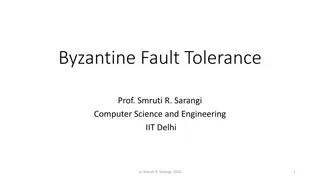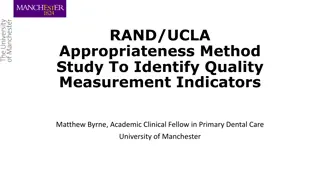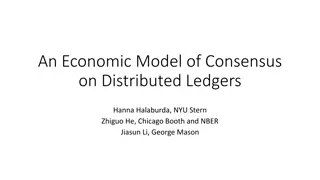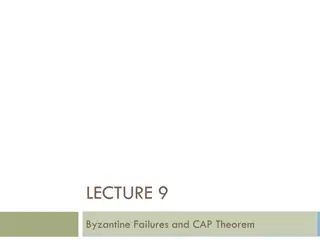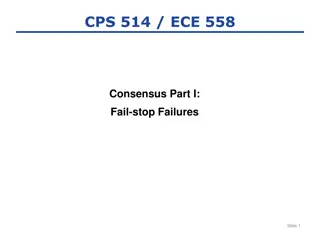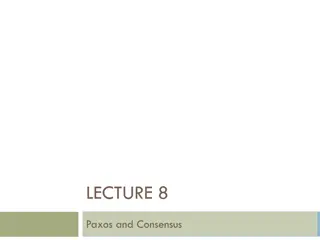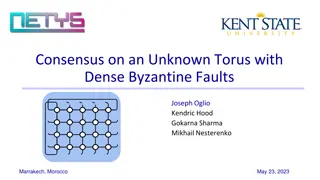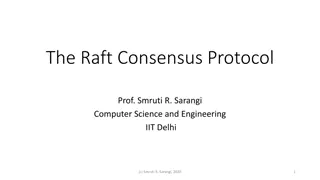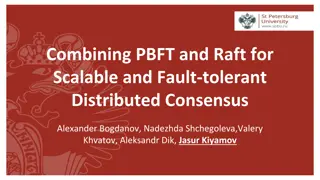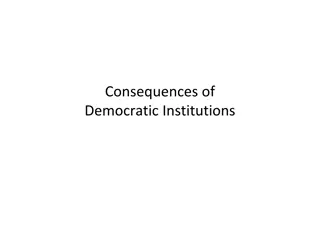Theories Explaining Deviant Sexual Behavior Throughout History
Explore historical theories on deviant sexual behavior, including demonological, anomie, psychoanalytical, human ecology, and somatotyping theories. These theories range from supernatural beliefs of possession to scientific interpretations of societal influences and individual characteristics.
2 views • 33 slides
Latest Consensus on UWB Sensing for 802.15.4ab
Co-authors from various companies present the latest agreement on ultra-wideband (UWB) sensing topics for the IEEE 802.15.4ab standard. The consensus includes definitions for sensing pulse shape, packet formats for bi/multi-static sensing, and support for specific sequences and patterns in UWB sensi
1 views • 27 slides
Understanding Byzantine Fault Tolerance in Distributed Systems
Byzantine fault tolerance is crucial in ensuring the reliability of distributed systems, especially in the presence of malicious nodes. This concept deals with normal faults, crash faults, and the challenging Byzantine faults, where nodes can exhibit deceptive behaviors. The Byzantine Generals Probl
0 views • 29 slides
Psychological Theories of Criminality: Understanding the Roots
Psychological theories of criminality delve into the association between intelligence, personality, learning, and criminal behavior. Major theories include Psychodynamic Theory by Freud, Behavioral Theory by Bandura, and Cognitive Theory by Kohlberg. These theories explore how unconscious mental pro
1 views • 20 slides
Understanding CS 394B: Blockchain Systems and Distributed Consensus
This course, led by Assistant Professor Marco Canini, delves into the technical aspects of blockchain technologies, distributed consensus, and secure software engineering. Students will engage in flipped classroom-style classes and paper presentations, critiquing research papers, defending research
0 views • 65 slides
Expert Consensus Statement on Exercise for Type 2 Diabetes
This expert consensus statement provides an update on exercise recommendations for individuals with type 2 diabetes (T2D), emphasizing the benefits of physical activity in improving glycemic management, insulin sensitivity, cardiovascular health, and overall disease risk reduction. The document high
0 views • 16 slides
Exploring Leadership Theories: Traits and Behaviors
Leadership theories have evolved from trait theory focusing on personal qualities to behavioral theories emphasizing actions and interactions. While early research sought universal traits for leadership, it encountered challenges due to varied traits among leaders and non-leaders. Behavioral theorie
2 views • 29 slides
Unraveling COVID-19 Conspiracy Theories and Hoaxes
Exploring various conspiracy theories surrounding the origins of COVID-19, from bat soup to bioweapons and espionage. Dive into wilder theories involving population control, world war, and even Disney's supposed predictions. Understand the differences between conspiracy theories and hoaxes, shedding
2 views • 11 slides
Understanding Sociological Theories and Frameworks
Sociological theories, encompassing micro and macro perspectives, provide a lens to interpret societal dynamics. Consensus theories like functionalism emphasize shared norms, while conflict theories such as Marxism highlight social inequalities. Social action theories like interactionism focus on in
3 views • 21 slides
Study on Identifying Quality Measurement Indicators in Primary Dental Care
This study by Matthew Byrne, an Academic Clinical Fellow at the University of Manchester, focuses on identifying quality measurement indicators for primary dental care. The aims include gaining consensus on important quality dimensions, assessing available quality measures, and identifying areas for
1 views • 12 slides
Online Seminar: Theories of Learning in Initial Teacher Education
This collection of online seminar slides introduces pre-service teachers to major theories of learning, including the Science of Learning through cognitive neuroscience. The presentation aims to help educators consider implications for teaching, recognize theories in action, and pose critical questi
1 views • 11 slides
Theories of Causation in Psychological and Social Sciences
Overview of theories of causation categorized into psychological, social psychological, and sociological perspectives. Psychological theories focus on instinctive, biological, and psychological qualities of abusers, including Attachment Theory, Psychodynamic Theory, Social Learning Theory, and Situa
0 views • 15 slides
Introduction to Quantum Chromodynamics & Field Theories in High-Energy Physics
Explore the fundamentals of Quantum Chromodynamics and Classical Field Theories in this informative lecture, covering topics such as global and local symmetries, Lagrangians, actions, and dynamics. Understand the significance of global and local symmetries in classical field theories, along with exa
2 views • 17 slides
Comprehensive Overview of Student Affairs Theories
This collection explores key theories in student affairs, including cognitive-structural theories, learning theories, and person-environment theories. Cognitive-structural theories delve into how individuals process information, while learning theories examine how people absorb knowledge. Person-env
3 views • 19 slides
Understanding Theories and Concepts in Research
The content delves into the fundamental concepts of theories and variables in research. It discusses the nature of theories, including descriptive, explanatory, and predictive theories. Additionally, it examines the role of concepts in providing identity and meaning to objects and phenomena. Through
1 views • 55 slides
Classical Trade Theories and Their Limitations in International Economics
Classical trade theories such as the Theory of Absolute Advantage by Adam Smith and the Theory of Comparative Advantage by David Ricardo highlight the benefits of free trade and specialization based on natural advantages. However, these theories have limitations, such as the inability to explain sce
0 views • 8 slides
Applying Theories and Models in Integrated Health: Module 3 Overview
This module delves into the application of various theories, perspectives, and practice models in integrated healthcare. Students will learn to utilize different theories to enhance their understanding and practice in integrated health, focusing on aspects like personal impact, behavioral change the
0 views • 78 slides
Economic Models of Consensus on Distributed Ledgers in Blockchain Technology
This study delves into Byzantine Fault Tolerance (BFT) protocols in the realm of distributed ledgers, exploring the complexities of achieving consensus in trusted adversarial environments. The research examines the classic problem in computer science where distributed nodes communicate to reach agre
0 views • 34 slides
Byzantine Failures and CAP Theorem Overview
Byzantine failures refer to arbitrary patterns of failures where nodes exhibit inconsistent behavior. This lecture discusses Byzantine agreement and the challenges in reaching consensus with faulty nodes. It explores the minimum number of processes needed for consensus and extends the concepts to ge
1 views • 32 slides
Distributed Consensus Models in Blockchain Networks
Economic and technical aspects of Byzantine Fault Tolerance (BFT) protocols for achieving consensus in distributed ledger systems are explored. The discussion delves into the challenges of maintaining trust in adversarial environments and the strategies employed by non-Byzantine nodes to mitigate un
0 views • 34 slides
Raft Consensus Algorithm Overview for Replicated State Machines
Raft is a consensus algorithm designed for replicated state machines to ensure fault tolerance and reliable service in distributed systems. It provides leader election, log replication, safety mechanisms, and client interactions for maintaining consistency among servers. The approach simplifies oper
0 views • 32 slides
Understanding Blockchains: Solving Trust Issues in Distributed Systems
Blockchains, as explained by John Kelsey from NIST, are essential for achieving mutual agreement in distributed systems without complete trust among participants. The analogy of chess-by-mail illustrates the need for consensus on the state of the board, similar to how blockchains ensure agreement on
2 views • 34 slides
Proposed New Baseline Cryogenics Layout Consensus at CERN Workshop
The consensus at the CERN workshop led to a proposal for a new baseline cryogenics layout with major components on the surface. The cost balance is deemed neutral and requires further investigation before submission. Various comparisons highlight the advantages and potential cost savings of the prop
2 views • 7 slides
DNA Data Archival: Solving Read Consensus Using OneJoin Algorithm
DNA data storage presents challenges in archiving digital information efficiently due to the nature of biological media. This article delves into the complexities of DNA data storage, emphasizing the importance of robust archival solutions. The OneJoin algorithm offers a scalable and cross-architect
0 views • 8 slides
Raft Consensus Algorithm Overview
Raft is a consensus algorithm designed for fault-tolerant replication of logs in distributed systems. It ensures that multiple servers maintain identical states for fault tolerance in various services like file systems, databases, and key-value stores. Raft employs a leader-based approach where one
0 views • 34 slides
Accelerating Lemma Learning Using Joins in Satisfiability Modulo Theories
Explore the use of joins in accelerating lemma learning within the context of Satisfiability Modulo Theories (SMT). The study covers various SMT applications at Microsoft and delves into the development of the Z3 solver. Key topics include theories, arithmetic operations, array theory, uninterpreted
0 views • 25 slides
Understanding Paxos and Consensus in Distributed Systems
This lecture covers the concept of Paxos and achieving consensus in distributed systems. It discusses the availability of P/B-based RSM, RSM via consensus, the context for today's lecture, and desirable properties of solutions. The analogy of the US Senate passing laws is used to explain the need fo
0 views • 46 slides
Understanding Consensus Algorithms in Paxos
Consensus algorithms play a vital role in distributed systems like Paxos. Paxos is a protocol that aims to achieve consensus among a majority of participants. It defines roles for nodes like proposers, acceptors, and learners, each serving a specific purpose in reaching agreement on a single value.
0 views • 24 slides
Byzantine Faults and Consensus on Unknown Torus
The discussion revolves around achieving consensus in the presence of dense Byzantine faults on an unknown torus. Various challenges and impossibility theorems are explored, highlighting the complexities of reaching an agreement in such fault-prone environments. The content delves into the limitatio
0 views • 23 slides
An Introduction to Consensus with Raft: Overview and Importance
This document provides an insightful introduction to consensus with the Raft algorithm, explaining its key concepts, including distributed system availability versus consistency, the importance of eliminating single points of failure, the need for consensus in building consistent storage systems, an
0 views • 20 slides
The Raft Consensus Algorithm: Simplifying Distributed Consensus
Consensus in distributed systems involves getting multiple servers to agree on a state. The Raft Consensus Algorithm, designed by Diego Ongaro and John Ousterhout from Stanford University, aims to make achieving consensus easier compared to other algorithms like Paxos. Raft utilizes a leader-based a
0 views • 26 slides
Understanding the Raft Consensus Protocol
The Raft Consensus Protocol, introduced by Prof. Smruti R. Sarangi, offers a more understandable and easier-to-implement alternative to Paxos for reaching agreement in distributed systems. Key concepts include replicated state machine model, leader election, and safety properties ensuring data consi
0 views • 27 slides
Enhancing Distributed Consensus: Combining PBFT and Raft for Improved Security
Addressing challenges in distributed systems, this study proposes a novel approach by combining PBFT and Raft consensus mechanisms to enhance scalability and fault tolerance. The research highlights the importance of secure data storage and identifies new attack mechanisms in today's digital landsca
0 views • 11 slides
Theories and Concepts in Semantics: Classical vs. Prototype Approaches
Explore different theories of concepts in semantics, including classical theories based on necessary and sufficient conditions, causal theories, and prototype theories. Compare their strengths and limitations in handling fuzziness, asymmetry, and internal structure of concepts. Discover how experime
0 views • 46 slides
Comparison of Economic Reform Sequencing in China
Andrew K. Rose from NUS Business School compares China's economic reform sequencing with the Washington Consensus. The optimal reform sequencing includes stabilization before reform, real before financial reform, and domestic before international reform. China's approach aligns oddly with the Washin
0 views • 14 slides
Integrating Theories and Models for Enhanced Health Practice
Explore the application of theories, perspectives, and practice models in integrated health through Module 3. Learn how theories guide assessment, treatment, and patient outcomes. Discover common theories enhancing assessment and supporting individuals through grief and loss. Gain insights into the
0 views • 78 slides
Nordic LCA/PEF Consensus Seminar and Report 2016: Insights and Progress
Nordic Environmental Footprint Group (NEF) is a key Nordic authority cooperation group under the Nordic Council of Ministers dedicated to discussing and exchanging viewpoints on EU Commission testing and uses of Product and Organizational Environmental Footprint. Through workshops and seminars, NEF
0 views • 16 slides
Comprehensive Overview of Leadership Theories and Styles
Leadership encompasses the ability to influence a group towards achieving goals by knowing oneself, communicating vision, building trust, and taking effective action. Various leadership styles include Autocratic, Democratic, Free-Rein, and Paternalistic, each with distinct decision-making approaches
0 views • 19 slides
The Art of Reaching Consensus - Reinhard Scholl ITU-T Leadership Meeting
Explore the nuances of consensus-building, leadership roles, and decision-making processes. Gain insights into defining consensus, understanding opposition, and the chairman's pivotal judgment role. Learn tips on crafting consensus effectively and making crucial inquiries. Delve into the significanc
0 views • 36 slides
Perspectives on Democratic Institutions: Majoritarian vs. Consensus Vision
Democratic institutions have consequential impacts on political representation, economic policy, ethnic conflict, and democratic survival. Two distinct visions, majoritarian and consensus, shape the distribution of power in governance. The majoritarian vision concentrates power in the hands of the m
0 views • 112 slides


